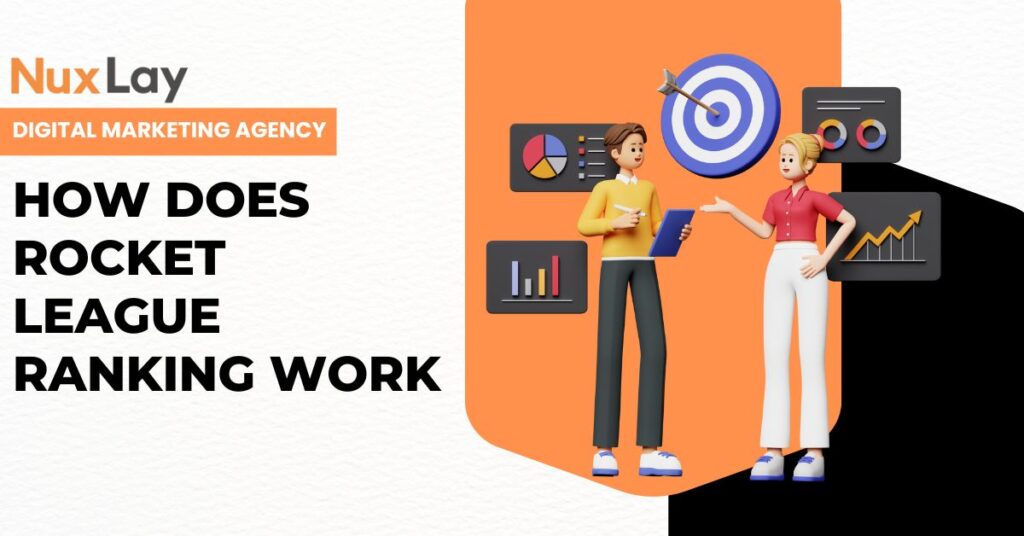If you’re an avid player or new enthusiast of Rocket League, you’ve likely asked yourself, “How does Rocket League ranking work?” Understanding the ins and outs of the Rocket League ranking system is crucial if you’re aiming to climb the ladder, improve your skill level, or even go pro. In this article, we’ll dive deep into how the ranking system functions, how progression is tracked, and what you can do to make the most of your ranked experience. Plus, we’ll highlight how NuxLay Digital Agency supports esports organizations and gaming content creators with cutting-edge digital solutions.
Rocket League, developed by Psyonix, is a fast-paced game that combines soccer mechanics with rocket-powered vehicles. Its ranking system is one of the most robust in esports, providing a competitive structure that appeals to casual players and seasoned professionals alike. Whether you’re grinding to reach Champion or holding steady at Platinum, understanding how the Rocket League ranking system works is a critical part of your journey.
Table of Contents
The Basics of Rocket League’s Ranking System
To understand how Rocket League ranking works, it’s essential to start with the basic structure of the ranked mode. Rocket League’s ranked mode is split across several different playlists, including:
- 1v1 (Solo Duel)
- 2v2 (Doubles)
- 3v3 (Standard)
- Rumble, Hoops, Dropshot, and Snow Day (Extra Modes)
Each playlist has its own independent ranking system, meaning your rank in 2v2 doesn’t affect your rank in 3v3, and vice versa. The primary competitive playlists (1v1, 2v2, and 3v3) are where most players aim to climb the ladder.
The core ranks in Rocket League are divided into the following tiers:
- Bronze (I-III)
- Silver (I-III)
- Gold (I-III)
- Platinum (I-III)
- Diamond (I-III)
- Champion (I-III)
- Grand Champion (I-III)
- Supersonic Legend (the highest competitive rank)
Each tier has divisions (I to IV), and you must win matches to move up through the divisions and into higher tiers. For example, you might go from Gold II Division II to Gold II Division III, and eventually to Gold III Division I as you win more games.
Matchmaking Rating (MMR): The Hidden Metric
The foundation of Rocket League’s ranking system is built upon Matchmaking Rating (MMR)—a hidden numerical value that determines how skilled you are. Every win or loss slightly shifts your MMR, and that score determines who you’re matched against and what your visible rank is.
For example, a player with a 900 MMR might be in Gold III, while someone at 1200 MMR could be in Diamond II. The MMR thresholds for each rank vary depending on the playlist and can change slightly between seasons. Although MMR isn’t displayed in the game by default, it plays a pivotal role in how Rocket League ranking works.
Promotion and Demotion in Rocket League
Promotion and demotion in Rocket League are straightforward yet nuanced. Winning games increases your MMR and pushes you toward the next division or tier. If you consistently perform well, you’ll be promoted to a higher division. Conversely, losing multiple matches will drop your MMR and eventually lead to demotion.
However, there’s a buffer zone at the border of ranks that allows you to lose a game or two without being immediately demoted. This helps prevent overly punishing rank fluctuations from a single bad match or toxic teammate.
Additionally, performance consistency and win streaks can give you momentum. Winning three or four matches in a row often results in quicker promotions, especially if you’re dominating your opponents.
How Placement Matches Affect Ranking
At the beginning of every Rocket League season or when you start playing a new ranked mode, you’re required to complete placement matches. These matches are critical in determining where your starting rank will be.
Generally, there are ten placement matches. Your performance in these games (wins, goals scored, assists, etc.) plays a big role in deciding your initial MMR. If you win most of them, you’ll likely start in a higher tier. Lose several, and your starting rank will be lower.
Placement matches are especially important for returning players who may have improved significantly since their last ranked season.
Seasonal Rewards and Rank Decay
To keep the ranking system fair and competitive, Rocket League includes seasonal rewards and rank decay mechanisms. At the end of each season, your highest rank achieved will be used to calculate your reward level, such as exclusive wheels, decals, or titles.
In some modes, particularly in Grand Champion and Supersonic Legend tiers, rank decay may occur if you’re inactive for a long period. This prevents high-level players from camping at the top without playing and keeps the competitive ecosystem dynamic.
Party MMR and Ranked Team Play
If you’re queuing with friends, Rocket League takes your Party MMR into account. This means that the system evaluates the average MMR of your team and matches you against opponents of similar skill.
However, if your party has players with significantly different ranks (e.g., a Gold player teaming up with a Diamond), you may face tougher opponents. This helps balance the competitive integrity and prevents smurfing or boosting.
Understanding this dynamic is critical when building a team to climb the ranks together.
NuxLay Digital Agency: Powering Esports Growth and Visibility
As esports continue to grow, so does the need for professional branding, digital marketing, and online presence. NuxLay Digital Agency specializes in helping gaming content creators, streamers, esports teams, and tournament organizers build a powerful digital footprint.
From designing high-performance websites for Rocket League streamers to crafting engaging social media campaigns that grow your audience, NuxLay brings professional digital strategy to the gaming space. Our data-driven approach aligns perfectly with the competitive nature of Rocket League. Whether you’re a team trying to monetize your brand or a content creator looking to boost your channel, NuxLay is the digital partner you need.
Understanding how Rocket League ranking works is one part of the journey—scaling your brand and reaching the right audience is the next, and NuxLay is here to help you do exactly that.
Tips to Improve Your Rocket League Rank
Knowing how Rocket League ranking works is only half the battle. The other half is putting that knowledge into action. Here are some tips to help you improve your rank and become a more competitive player:
1. Master the Mechanics
Before chasing higher ranks, make sure you’ve mastered fundamental skills like dribbling, aerials, wall hits, and fast recoveries. These mechanics separate lower ranks from Diamond and above.
2. Understand Rotations
Rotation is key in Rocket League, especially in 3v3. Learn to rotate back instead of chasing the ball, support your teammates, and avoid double-commits. Good rotations lead to more consistent team play and fewer goals conceded.
3. Train with Intention
Use Rocket League’s training packs and custom maps to target your weaknesses. Whether it’s shooting accuracy or defending clears, training for 15 minutes daily can drastically boost your performance.
4. Watch Professional Gameplay
Studying pros like those in RLCS (Rocket League Championship Series) can help you learn positioning, boost management, and decision-making. Try to emulate their strategies in your ranked matches.
5. Queue Smartly
Play ranked when you’re focused and have good internet. Avoid playing tilted or when fatigued. Rocket League is a game of quick decisions, and mental clarity makes a big difference.
6. Communication Is Key
When playing in duos or trios, use voice chat or quick chat commands to coordinate with teammates. A well-timed “I got it!” can prevent confusion and help maintain solid rotations.
The Future of Rocket League’s Ranking System
Rocket League’s ranking system has continued to evolve since the game’s release. New updates bring MMR adjustments, improved matchmaking, and quality-of-life features. Psyonix regularly listens to player feedback to balance competitive integrity with a fun experience.
As cross-platform play grows and esports events expand, we can expect more sophisticated ranking tools, better analytics, and expanded features to reward long-term competitive commitment.
For gamers, content creators, and aspiring professionals, staying updated with how Rocket League ranking works ensures you can adapt and stay ahead of the curve.
Final Thoughts: Stay Competitive, Stay Visible
Understanding how Rocket League ranking works empowers players to take control of their performance and progression. But beyond gameplay, having a visible, professional presence online can set you apart in the crowded esports ecosystem.
That’s where NuxLay Digital Agency comes in. We don’t just understand digital marketing—we understand gaming. Whether you’re building a Rocket League team, running a YouTube channel, or streaming on Twitch, NuxLay helps you connect with the right audience, optimize your content, and grow your brand with purpose.
Level up your game—and your presence—with NuxLay.






